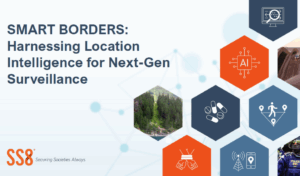
Location Intelligence: Protecting People and Property
Geofencing is a critical capability that builds context and insight around location intelligence, extending the value of location analysis across use cases.
In the coming years, AI is expected to dramatically accelerate the evolution of lawful intelligence, giving law enforcement agencies (LEAs) the ability to efficiently draw insight from data at unprecedented
Quantum Computing may enable communications that do not travel across a network in the conventional sense and endanger traditional encryption methods, carrying critical implications for lawful intelligence.
Preventing illicit trafficking is a daunting task for border security agencies. AI-powered Computer Vision and location intelligence enhance security, reduce costs, and close surveillance gaps.
Effective lawful intelligence solutions do more than just ingest and analyze data. They build evidential narratives compelling enough for court that are backed by a fully auditable chain of custody.
Encryption and OTT apps limit the value of lawful eavesdropping tools like wiretaps, but mobile networks offer a powerful engine for new insights: real-time geographical awareness using high-accuracy location.

Geofencing is a critical capability that builds context and insight around location intelligence, extending the value of location analysis across use cases.

Blanketing a nation’s borders with video surveillance is impractical. AI-powered Computer Vision improves efficiency by analyzing feeds in real-time, but not without high costs. Location intelligence helps.

During missions, field agents often seize multiple devices, each holding crucial forensic location data – but if they can’t swiftly analyze the data in the field, the intelligence may be wasted.

5G networks allow operators to provide high-accuracy location data to government agencies to improve border security. Using geofencing and other techniques, agents can leverage this data to create alerts.

Mobile money apps have transformed financial access in developing countries, but fraudsters can impersonate a device, corrupt agents, swap SIM cards, and more.
In this October 15, 2024 session from Mobile Europe’s Telco to Techco, SS8 explores how emergency caller location regulations impact location intelligence for criminal investigations.
En este seminario web, Javier D’Agostino analiza cómo LocationWise detecta y desactiva los dispositivos de contrabando en los centros de detención sin alertar al usuario ni interferir con el uso legítimo.

Transcontinental Criminal Organizations are more sophisticated than ever, leveraging complex international networks and new technologies like encrypted devices and RFID trackers to smuggle illegal drugs.

A European government sought greater protection of its borders from illegal immigration, human trafficking, and smuggling. Without the ability to locate and track mobile devices,

En esta entrevista con Telesemana, Javier D’Agostino, Director de Ventas para América Latina de SS8, analiza las implicaciones de 5G para los operadores de redes
THE DATA SILO DILEMMA FOR LAW ENFORCEMENT
How to Ingest, Filter and Query 5G Volumes
Webinar Presented by Kevin McTiernan